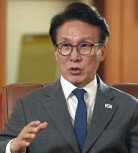[Editorial] FSS needs complete investigation
[Editorial] FSS needs complete investigation
Posted October. 30, 2000 13:29,
It is truly pitiful to learn of such decay and corruption within the ranks of the Financial Supervisory Service, which holds the very responsibility for financial reform.
To have such a scandal shed new light on the FSS, which has the responsibility of weeding out financial institutions and businesses for closure, cannot but lead to worries concerning the second phase financial reform with 40 trillion won of public fund injection. In addition, should the scandal lead to a loss of faith and trust in the international financial market, the economic slowdown, which has plagued Korea, will no doubt worsen at ever frightening speed.
On a daily basis, evidence is being found concerning before-the-fact knowledge of Dongbang Mutual Savings and Financial Co.'s irregularities by the FSS. The suggestion by prosecution team for the Daeshin Mutual Savings and Financial Co.'s scandal calling for special investigation of Dongbang as the major shareholders for the two were one and the same individual went unheeded.
In addition, while Dongbang had been listed for investigative probes in both February and August, it escaped through suspicious means.
Such actions condoning concealment, as well as the reduction in disciplinary action for the individuals guilty of illegal loans at Dongbang and Daeshin, point toward the possibility of involvement of various high-ranking officials other than the former First Director of Prosecution for Banking Irregularities Chang Lae-Chan, currently in hiding.
Prosecutors have revealed their intention to summon the members of the FSS and begin interrogation. For a complete picture of the scandal, it might be necessary to expand the probe to more individuals outranking the former First Director Chang.
Although there is a limited criminal responsibility for the current Financial Supervisory Commission Chairman Lee Keun-Young, who has been at his post only two months, as such concealment illegality had taken place after his appointment to the post, he might have to answer for his failure in leadership. For the scandal that has drawn the attention of all Koreans, it would be advisable for all the responsible and even those suspected of responsibility to resign from their posts, as the investigation continues on toward full disclosure.
The more urgent agenda for Korea is the reform of the financial and the business sectors, considered the priority for the Korean economy. Questions have been raised asking whether such demoralized organization directing the reform could have the influence and authority enough to enforce structural reform and whether the companies listed for closures stand idly by.
As a measure to overcome the foreign currency crisis, the government launched the gigantic financial supervisory organization, which unified the banking, securities, insurance, finance and credit watchdog organizations. Having become such a massive giant, such a deadly scandal has been brewing as an almost natural consequence of institutionalization of authority.
Building on the lessons from the scandal, it would be advisable to form a more balanced system of supervision and also to strengthen the authority of internal audits. However, those targeted for reform should not be put on the helm for reform by the FSS.





![[천광암 칼럼]장동혁은 대체 왜 이럴까](https://dimg.donga.com/c/138/175/90/1/wps/NEWS/IMAGE/2026/02/22/133399127.1.jpg)

